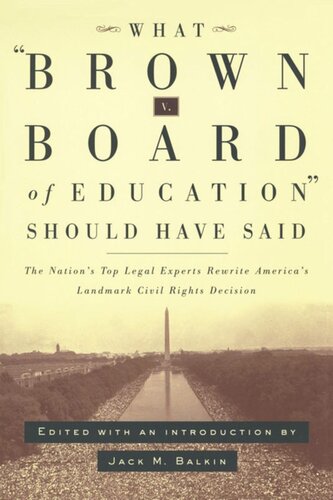

Most ebook files are in PDF format, so you can easily read them using various software such as Foxit Reader or directly on the Google Chrome browser.
Some ebook files are released by publishers in other formats such as .awz, .mobi, .epub, .fb2, etc. You may need to install specific software to read these formats on mobile/PC, such as Calibre.
Please read the tutorial at this link: https://ebookbell.com/faq
We offer FREE conversion to the popular formats you request; however, this may take some time. Therefore, right after payment, please email us, and we will try to provide the service as quickly as possible.
For some exceptional file formats or broken links (if any), please refrain from opening any disputes. Instead, email us first, and we will try to assist within a maximum of 6 hours.
EbookBell Team

4.8
104 reviewsNine of America's top legal experts rewrite the landmark desegregation decision as they would like it to have been written.
Brown v. Board of Education, the Supreme Court's landmark 1954 decision ordering the desegregation of America's public schools, is perhaps the most famous case in American constitutional law. Criticized and even openly defied when first handed down, in half a century Brown has become a venerated symbol of equality and civil rights.
Its meaning, however, remains as contested as the case is celebrated. In the decades since the original decision, constitutional interpreters of all stripes have found within it different meanings. Both supporters and opponents of affirmative action have claimed the mantle of Brown, criticizing the other side for betraying its spirit. Meanwhile, the opinion itself has often been criticized as bland and uninspiring, carefully written to avoid controversy and maintain unanimity among the Justices.
As the 50th anniversary of Brown approaches, America's schools are increasingly divided by race and class. Liberals and conservatives alike harbor profound regrets about the development of race relations since Brown, while disagreeing heatedly about the proper role of the courts in promoting civil equality and civil rights.
In this volume, nine of America's top constitutional and civil rights experts have been challenged to rewrite the Brown decision as they would like it to have been written, incorporating what they now know about the subsequent history of the United States but making use of only those sources available at the time of the original decision. In addition, Jack Balkin gives a detailed introduction to the case, chronicling the history of the litigation in Brown, and explaining the current debates over its legacy.
Contributors include: Bruce Ackerman, Jack M Balkin, Derrick A. Bell, Drew S. Days, John Hart Ely, Catharine A. MacKinnon, Michael W. McConnell, Frank I Michelman, and Cass R. Sunstein.